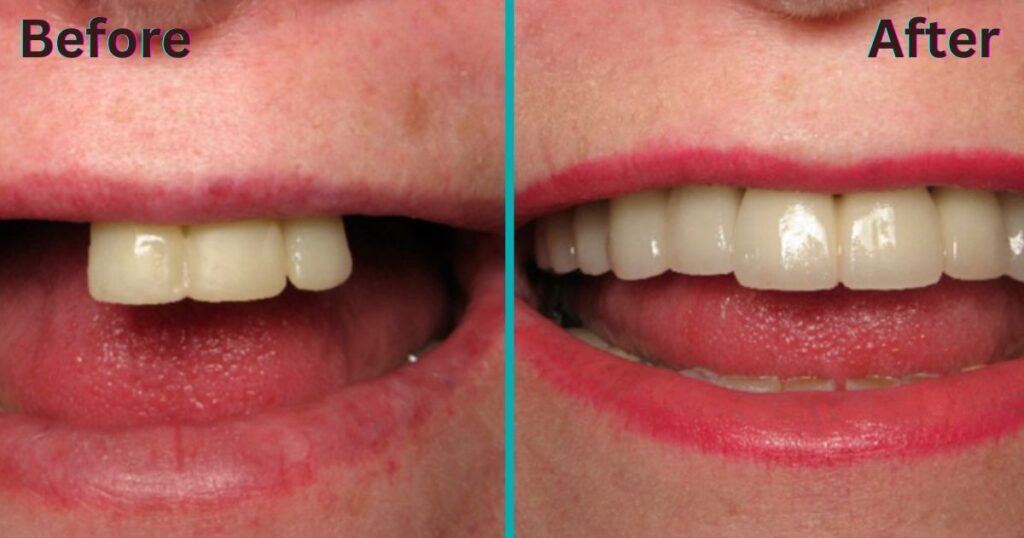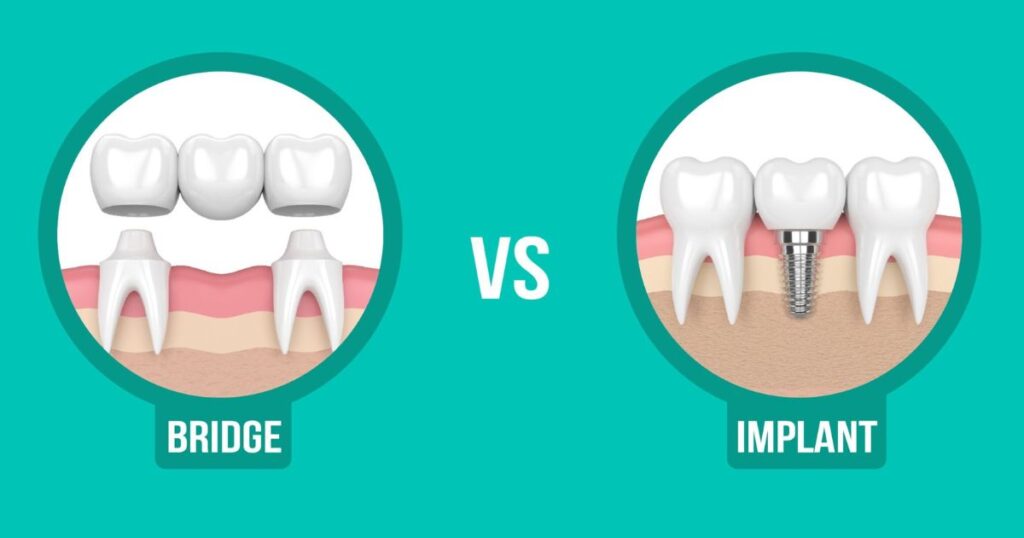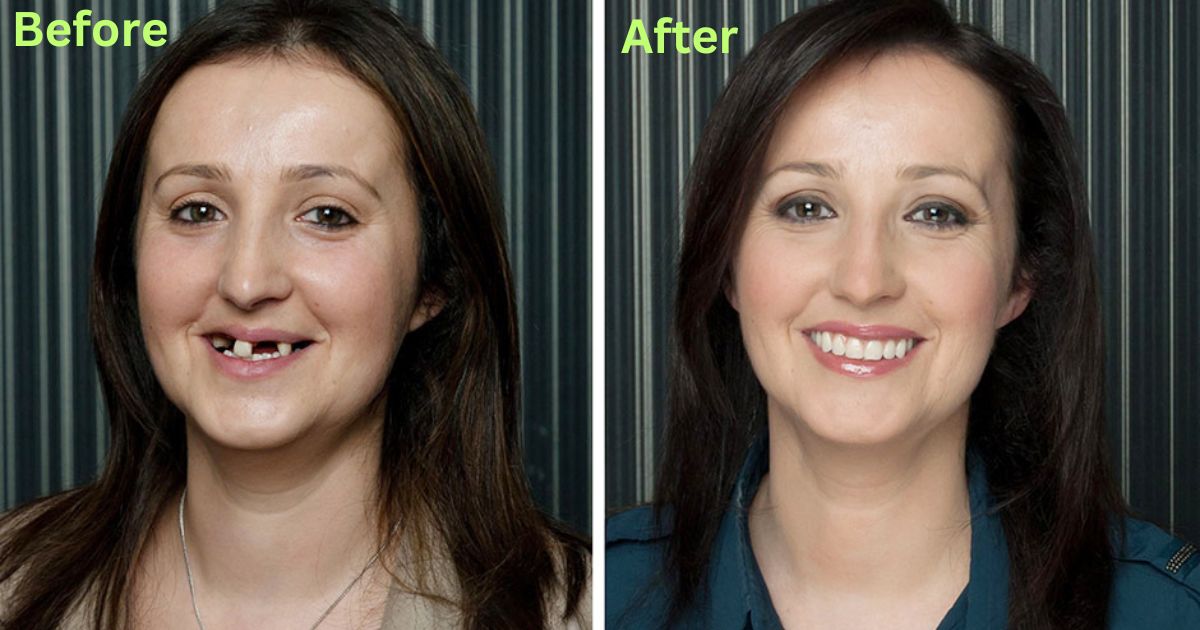Losing one or more teeth can have a major impact on your overall quality of life. It affects not just your appearance and self-confidence, but also dental health and simple abilities like eating or speaking clearly. For many Americans, dental implants provide a revolutionary solution for restoring smiles and bite functionality. But what exactly are dental implants? And what can you expect from the before and after experience?
What Exactly Are Dental Implants?
Dental implants are artificial tooth roots that are surgically anchored into the jawbone to act as a foundation for tooth replacements called crowns. Unlike dentures or bridges, dental implants actually fuse to your bone through a process called osseointegration, providing a sturdy, permanent base for prosthetic teeth.
The implant itself is a small, screw-shaped post typically made from titanium that gets positioned precisely in the jawbone. Once the implant integrates with the bone (over several months), a crown is securely attached to the protruding piece. This final crown looks, feels and performs remarkably similar to a natural tooth.
Implants offer several advantages over other tooth replacement methods:
Durability: With proper care, dental implants can last 15+ years, even a lifetime in many cases
Natural Look/Feel: Crowns are custom-tinted and shaped to blend seamlessly with your mouth
Easier Eating/Speaking: Implants function like natural teeth, eliminating discomfort or instability when chewing or speaking
Convenient Care: Implants only require brushing and flossing like your other teeth.
Am I a Candidate for Dental Implants?
Not everyone qualifies for traditional dental implants depending on their jaw bone density and other oral health factors. Good candidates should have:
- Sufficient bone quantity and quality to integrate properly with implants
- Overall good oral health without gum disease, cavities or infections
- Committed to meticulous oral hygiene for maintaining implants
If your jaw bone is too soft or thin for implants, dentists may perform bone grafts to remediate density. Other conditions like uncontrolled diabetes, leukemia, or heavy smoking can prevent successful bone fusion.
For those unable or unwilling to receive implants due to various limitations, dental bridges or dentures are still effective alternatives. However, neither provide the durability, permanence or natural look/feel of implants.
The Dental Implant Procedure: A Step-by-Step Walkthrough
For most patients receiving a single implant, the complete process occurs over two main phases spanning several months:
1. Surgical Implant Placement
- The first step involves surgically inserting the implant post into the jawbone under local anesthesia. This minor procedure lasts 1-2 hours.
2. Integration and Healing
- Over the next 3-6 months, the implant and bone are given time to integrate through a process called osseointegration. During this period, you’ll be fitted for a temporary crown to maintain appearance and functionality.
3. Final Prosthetic Attachment
- Once the implant fuses to the bone, you’ll have another appointment to remove the temporary crown. The permanent, custom-crafted prosthetic tooth will be precisely attached to the post.
More extensive implant cases involving multiple teeth or full arches may require additional steps like bone grafts or zygomatic implants. But the overall process still follows the same osseointegration and prosthetic attachment principles.
What to Expect in Your Dental Implants Before and After Journey

Your before and after dental implant experience will differ depending on how many teeth are involved and your individual healing ability. But in general, here’s what to expect:
After Implant Surgery:
- Swelling of gums and face
- Minor bleeding
- Bruising of skin and muscles around area
- Pain and discomfort up to a week (over-the-counter medication can help)
During the integration process, discomfort should subside within a week or two while the implant site heals. Limiting your diet to soft foods during recovery helps avoid irritating the area.
After Final Restoration: Now is when you get to appreciate the full life-changing effects of dental implants! Activities that were once challenging like eating crunchy foods or speaking clearly become simple again. Most importantly, your confidence gets restored.
“After the implant process was complete, I could smile again without feeling self-conscious about my teeth. It was life-changing.” – David L., Dental Implant Patient.
Dental Implants Cost Breakdown for US Patients
Unfortunately, the exceptional results of dental implants come at a premium cost. In the United States, prices average:
- Single Tooth Implant: $3,000-$6,000
- Multiple Tooth Implants: $25,000-$50,000+ for full mouth reconstructions
Factors influencing the total dental implant costs include:
- The number of teeth being replaced
- If bone grafts, 3D imaging or extractions are required
- The experience level and geographical location of your dentist
- Whether you see a specialist (oral surgeon, prosthodontist) or general dentist
| Common Procedures | Estimated Cost Ranges |
|---|---|
| Single Tooth Implant | $3,000 – $6,000 |
| Implant Abutment | $300 – $500 |
| Implant Crown | $1,000 – $3,000 |
| Bone Graft | $200 – $1,200 |
| Extraction | $75 – $600 |
While the upfront investment is substantial, dental implants offer excellent value compared to other options that may need replacing every 5-10 years.
To offset costs, check if your dental insurance policy covers any portion of implant procedures. Many practices also offer flexible financing through third-parties like CareCredit to make dental implants more accessible.
Dental Implants Before and After: Stunning Transformations
Perhaps the biggest factor that attracts patients to dental implants are the incredible before and after results. Modern implants and prosthetics are virtually indistinguishable from natural teeth in both appearance and functionality.
Just look at these stunning smile makeovers courtesy of skilled implant dentists:
Before Dental Implants: [Image of person with visibly missing tooth]
After Dental Implants:
[Image showing the same person with a complete, brilliant smile]
Beyond just aesthetics, patients frequently cite improved self-confidence and overall quality of life after getting their smiles restored.
“My implants have helped me chew properly again after years of struggling with missing and loose teeth. I also don’t feel anxious about smiling in public anymore.” – Rebecca F., Dental Implant Patient
With proper oral hygiene and routine dental visits, high-quality dental implant work can last decades or more. Achieving those life-changing before and after results starts with selecting the right implant dentist.
Finding the Right Implant Dentist Near You
When it comes to intricate, costly and permanent dental procedures like implants, working with a highly skilled and credentialed dentist cannot be overstated. Here are some tips for finding a qualified implant specialist:
Verify Credentials: Only consider dentists who have completed extensive surgical training and certification for implant procedures. This usually involves postgraduate education in oral and maxillofacial surgery or prosthodontics.
Experience Matters: In addition to credentials, choose practitioners who frequently work with implants and have extensive hands-on experience. Ask about their history placing implants.
Read Reviews: Spend time reading real patient reviews and testimonials regarding dentists’ skill, results and chairside manner. Poor reviews could be a red flag.
Get Referrals: Ask friends, coworkers or your existing dentist for recommendations on reputable implant specialists in your area.
Check Costs: Don’t simply default to the lowest cost provider. Reasonable fees showing dentists value their work are preferable.
Taking your time doing research upfront helps ensure you select a highly capable dentist. This dramatically improves your chances of a smooth dental implant process with stunning permanent results.
With the right dentist and proper commitment to oral health, the before and after transformation with dental implants can be truly life-altering. Boost your confidence, restore full bite functionality and achieve the brilliant smile you’ve been missing!
Lifespan of Dental Implants vs Other Tooth Replacements

One of the biggest selling points for dental implants is their longevity compared to other restorative options like dentures, bridges or crowns. With proper placement, good oral hygiene and regular check-ups, dental implants can last 25 years or more. Here’s how implants stack up:
- Dental Implants: 25+ years (potentially permanent)
- Fixed Bridges: 5-15 years
- Removable Partial Dentures: 5-10 years
- Complete Dentures: 5-10 years
- Crowns: 5-15 years (may require replacement)
The key reason dental implants provide such unprecedented durability comes down to osseointegration – the process where the titanium implant post fuses directly with the patient’s jawbone. This creates an extremely sturdy and stable foundation for the prosthetic tooth.
In contrast, other tooth replacements like dentures and bridges simply rest on top of the gum line. Over time, this can create instability and quicker degradation as the jawbone atrophies from lack of dental root structure.
“When cared for properly with regular hygiene visits, there is no reason modern dental implants should not last a lifetime.” – Dr. Mark Burhenne, DDS.
Advancements that Simplify the Implant Process
The latest evolutions in dental technology and techniques help streamline the implant procedure for improved results and convenience for patients.
Guided Implant Surgery: By combining 3D imaging with precise surgical guides, dentists can pre-plan and optimize implant placement better than freehand methods. This increases accuracy and reduces surgery time.
CEREC One-Visit Crowns: Rather than wearing temporaries during osseointegration, some dental offices utilize CEREC technology to mill customized permanent crowns chairside in a single appointment.
CT/Cone Beam Imaging: Advanced 3D cone beam imaging helps evaluate bone density and identify potential risk factors like sinus cavities or nerves prior to implant surgery.
Mini Dental Implants: Shorter, ultranarrow mini implants offer a more economical solution for stabilizing dentures in patients with lower bone density.
As implant technology progresses, the process becomes more efficient, customized and minimally-invasive compared to traditional dental implant techniques.
Managing Expectations for “Teeth in a Day” Protocols
While the majority of implant procedures still take several months to allow for bone fusion, some dental clinics now advertise options for “immediate” or “teeth in one day” implants.
For good candidates with adequate bone density, these protocols involve:
- Extracting any remaining teeth
- Placing multiple implant posts
- Attaching a temporary fixed denture/bridge on the implants the same day
This allows patients to conveniently have new functioning teeth right away. However, managing expectations is key with “teeth in a day” to avoid complications or disappointment.
A period of several weeks up to a few months is still required for the implants to partially integrate before the final restoration can be placed. Bite adjustment and maintenance appointments will also be needed during this transition phase.
It’s critical to follow all post-op instructions to the letter, like:
- Sticking to soft foods to allow healing
- Avoiding chewing on the implants
- Keeping the area meticulously clean
While “teeth in a day” provides some nice immediate improvements, true long-term success still comes down to thoroughly integrating the implants with patience before getting final prosthetics.
Maintaining Dental Implants for Decades of Smiles
After investing the significant time and money into getting dental implants, protecting that investment through diligent at-home care becomes crucial. With proper maintenance, implants can easily provide 25+ years of confident smiles.
Key tips for extending the lifespan of dental implants include:
✔️ Brushing and flossing around implant crowns thoroughly every day
✔️ Using antibacterial mouth rinses per your dentist’s recommendations
✔️ Avoiding hard, sticky foods that can damage implant crowns
✔️ Quitting smoking to support integration and overall oral health
✔️ Scheduling regular cleanings and checkups to monitor implants
Neglecting dental hygiene can lead to peri-implantitis – a form of gum disease specific to implants. This inflammation and bone loss around the implant site can ultimately cause failure and require replacement.
In short, caring for dental implants really isn’t much different from natural teeth. Stay committed to the same daily brushing, flossing and periodic cleanings you’d do anyway. This straightforward maintenance ensures you’ll reap the lifelong benefits of your smile restoration investment.
Benefits of Dental Implants at a Glance
Dental implants offer several significant advantages over other tooth replacement options:
✓ Natural Appearance and Function Like Real Teeth
✓ Unmatched Durability and Permanence
✓ No Slipping or Requiring Adhesives
✓ Preserves Facial Structure and Bone
✓ Improves Speech and Eating Ability
✓ Easy Maintenance – Just Brush and Floss
With their lifelike look, feel and strength, implants allow you to renew your smile and confidence fully.
Top Reasons for Considering Dental Implants
While implants represent a significant investment, there are compelling reasons to explore them:
- You’re Missing One or More Teeth
- You Want a Permanent, Hassle-Free Solution
- You Struggle With Ill-Fitting Dentures
- You Desire a Confident, Natural-Looking Smile
- You Value a Long-Term, Cost-Effective Option
Don’t let missing teeth hold you back any longer. Dental implants can permanently transform your smile!
Factors Determining Implant Treatment Costs
- The Number of Teeth Being Replaced
- If Additional Bone Grafting is Required
- Extraction and Imaging Fees
- The Experience of Your Implant Dentist
- Geographic Location and Market Rates
Be wary of prices that seem “too good to be true.” Quality implant work from skilled providers is an investment in your health and confidence.<H3>Life with Dental Implants: Before vs After</H3>
Before Dental Implants:
- Avoiding smiling due to missing teeth
- Difficulties eating certain foods
- Low self-confidence
- Potential jawbone deterioration
- Frequent denture discomfort or slippage
After Successful Implants:
- A full, brilliant smile without gaps
- Ability to eat anything without limitations
- Renewed self-assurance in social settings
- Preservation of facial contours and bone
- Permanent, carefree tooth replacements
It’s a life-transforming change that restores full oral function and confidence!











